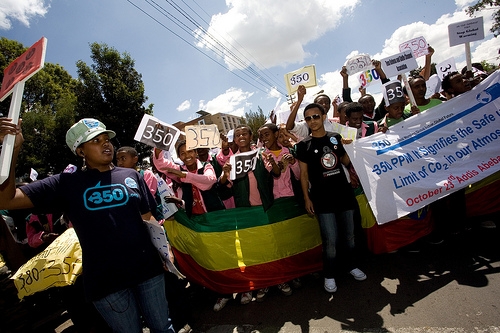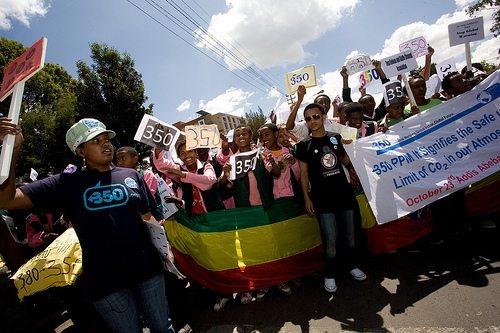Of all the amazing stories that emerged from last month’s historic International Day of Climate Action, the one that really caught my eye (and made my jaw drop in disbelief and admiration) was that of 15,000 Ethiopian students swarming though the streets of Addis Ababa brandishing 350 signs and whooping it up big time in support of bold global climate solutions.
If you haven’t seen the video yet, check it out. It’s definitely something to behold.
Less jaw-dropping was the turnout at our action in D.C. which topped out at less than a thousand. Considering the massive outreach and buzz-building effort my fellow organizers and I invested in the event, that number should have been much closer to what they got in Addis Ababa. But somehow we didn’t even come close. So what exactly did the Ethiopians have going for them that we didn’t?
Sunny weather, sans monsoon-style rain was certainly one factor. But there had to be more to it than that. After all, this was supposed to be the mother of all climate actions, our last big change before Copenhagen, before one of the most vitally important meetings in human history to give our leaders the kind of big grassroots push they need to really do something. With so much at stake how could anyone who cares about this issue have let a little rain keep them away from marching with us? Why wasn’t everyone there?
Roz Savage asked the same question about the turnout at her Oct. 24 rally in London, and she suggested a pretty good answer: global warming is a downer. People just don’t want to think about it. They’ve got enough problems to deal with in their everyday lives. And, you know, she’s absolutely right. The real reason for American activist apathy is that to most Americans, climate change is just another problem — one of a million things to worry about instead of the ultimate crisis. Worse, for most of us it actually sits pretty low on the totem pole of problems. In polls Americans consistently rank the economy, war, and health care well above climate change in the triage of issues to worry about. And this isn’t because people don’t appreciate how serious climate change is. It’s just that we only appreciate it intellectually. We don’t yet feel it in our everyday lives with the same kind of visceral immediacy with which we feel economic or health care problems, and for that reason most people just aren’t ready to take to the streets for it, rain or shine.
 Photo courtesy 350.org via Flickr And this brings us back to those kids in Ethiopia. Sunny weather and good organizing aside, I’d wager that what really drove them to the streets was the one thing that the climate movement in America (and most of the industrialized world) is missing: a sense of urgency, a visceral appreciation of the problem. The kind of urgency and visceral appreciation that comes from experience with the kinds of hardships that catastrophic climate change will impose: drought and famine, political, social, and economic instability. Ethiopia’s effort to escape such miseries has been slow and arduous, and the fall back into their grip wouldn’t be very far. The country ranks at 171 out of 182 countries on the U.N. human development index, making it one of the most vulnerable countries in the world to the catastrophic impacts of runaway climate change. Such vulnerability has a way of inspiring serious street stomping action on the scale that we just saw in Addis Ababa.
Photo courtesy 350.org via Flickr And this brings us back to those kids in Ethiopia. Sunny weather and good organizing aside, I’d wager that what really drove them to the streets was the one thing that the climate movement in America (and most of the industrialized world) is missing: a sense of urgency, a visceral appreciation of the problem. The kind of urgency and visceral appreciation that comes from experience with the kinds of hardships that catastrophic climate change will impose: drought and famine, political, social, and economic instability. Ethiopia’s effort to escape such miseries has been slow and arduous, and the fall back into their grip wouldn’t be very far. The country ranks at 171 out of 182 countries on the U.N. human development index, making it one of the most vulnerable countries in the world to the catastrophic impacts of runaway climate change. Such vulnerability has a way of inspiring serious street stomping action on the scale that we just saw in Addis Ababa.
So does this mean Americans may have to experience a few climate induced disasters like an agricultural collapse or a string of additional Katrinas before our climate movement can reach the kind of scale that we really need right now? Maybe, but I certainly hope not. I hope the movement expands along the lines suggested by my colleague Ted Glick — not as an explosive reaction to a national trauma, but as a kind of outgrowth and blossoming of the many seeds climate activists have been planting recently via the mounting anti-coal demonstrations and big days of action like the 24th. But however that growth occurs, one thing is for certain: if it’s going to have any serious impact on policy in the time frame that we need, it has to happen fast. And to make that happen we’re going to have to somehow quickly shake off our remaining climate complacency and start feeling the kind of visceral urgency that seems to be inspiring the Ethiopian climate movement.
That’s right, America: In order to help save the world, we’ve got to wake up and start thinking and acting a lot more like Ethiopians.



